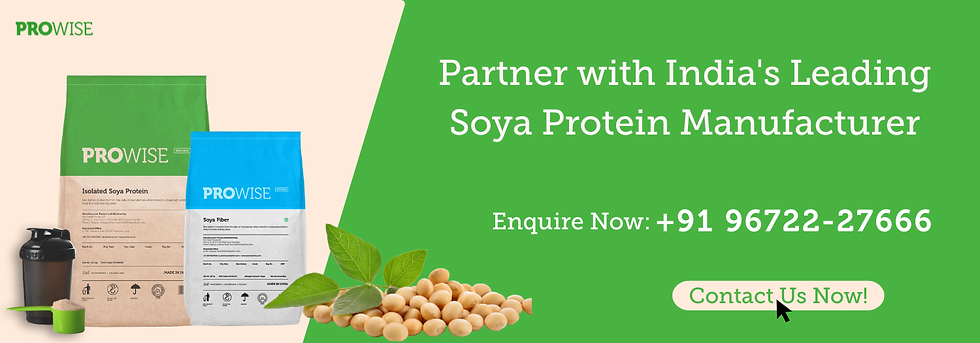Is Soya Protein Gluten-Free? What You Need to Know
- Indrajeet Paul
- Jul 1, 2025
- 4 min read
Updated: Dec 31, 2025

As a nation that has been heavily dependent on wheat and dairy products for generations, gluten-free and soya protein products may seem like another trend. But this shift is more than just hype. It's backed by changing health needs and growing awareness.
Soya is known for being a rich source of protein, offering around 52 grams of protein per 100 grams. On the other hand, more people, especially the younger generation, are becoming sensitive or intolerant to gluten. So, if you have been wondering, "Is soya protein gluten-free?" this guide will help clear your doubts.
Read on to understand what gluten is, how it affects your body, and how you can meet your protein goals with soya by staying within your dietary needs.
What is Gluten?
Gluten is a group of proteins naturally found in certain grains, such as wheat, barley, and rye. The word gluten comes from Latin and means “glue,”. This is because when gluten flour is mixed with water, it becomes very sticky and stretchy. Gluten gives dough its elastic texture and helps it hold its shape during baking.
Any food made from wheat, barley or rye contains gluten. These include:
Bread and pizza bases
Pasta and noodles made from wheat
Semolina (suji)
Rusk, khari and biscuits
Cakes, pastries and muffins
Breakfast cereals
Wheat-based snacks
Soya sauce
Processed foods like soups, gravies, ready-to-eat meals, and sauces
For most people, gluten doesn’t cause any issues. But in some cases, the body may not respond well to it. There are two main conditions linked to this:
Gluten intolerance (non-celiac gluten sensitivity): This refers to difficulty in digesting gluten. It may cause symptoms such as bloating, fatigue, headaches, or stomach discomfort after consuming foods containing gluten.
Celiac disease: This is an autoimmune condition. When someone with celiac disease eats gluten, their immune system reacts and damages the lining of the small intestine. Over time, this can affect nutrient absorption and lead to other health issues.
Is Soya Gluten-Free?
Yes, soya is naturally gluten-free. Soya beans do not belong to the wheat or grain family, which means they do not contain gluten by default. Whether whole or processed, pure soya is safe for people who are gluten intolerant or have celiac disease.
However, it’s important to be careful with packaged or processed soya products. Some of them may be made in facilities where wheat or barley is also handled. This can lead to cross-contamination, especially if the brand doesn’t follow gluten-free processing standards.
Are Soya Products Gluten-Free?
Soya comes in many forms, and while the soya bean itself is gluten-free, some products may include added ingredients or face cross-contamination during processing.
Here’s a simple guide to help you understand what’s safe:
Soya Sauce: Traditionally, soya sauce is made by fermenting soya beans with wheat, which is why it contains gluten. This process gives it its rich flavor and dark color. As a result, most regular soya sauces are not gluten-free. However, gluten-free versions are available in the market, made without wheat. Always check the label before buying.
Soya Lecithin: A fatty substance extracted from soya beans, often used as an emulsifier in packaged foods. It is naturally gluten-free and usually safe for people with gluten intolerance.
Soya Oil: Refined oil made from soya beans. It does not contain gluten and is safe to consume.
Soya Milk: Plant-based milk made from soaked and blended soya beans. Plain soya milk is gluten-free, but always check flavored or sweetened versions for added ingredients.
Soya Flour: Made by grinding roasted or raw soya beans. It is naturally gluten-free, but contamination can occur during processing if it is handled with wheat-based flour.
Textured Vegetable Protein (TVP) / Soya Chunks/Granules: If you are wondering, "Is textured vegetable protein (TVP) gluten-free?" the answer is yes. TVP is made from defatted soya flour, making it naturally gluten-free.
Soya Protein (Isolated or Concentrated): Extracted from soya beans to provide high protein content. It is gluten-free if processed in a facility that does not process gluten. Always read labels or choose trusted brands, such as Prowise India.
Therefore, if you want a clean, plant-based protein without gluten, isolated soya protein is the best choice for you.

Is Soya Protein Safe for People with Gluten Intolerance and Celiac Disease?
Yes, soya protein is safe as long as it is pure and processed in a gluten-free environment. Soya itself doesn’t contain gluten, so isolated or concentrated soya protein is naturally gluten-free. But if it’s made or packed in a facility that also handles wheat or other gluten-containing grains, there’s a risk of cross-contamination.
Here’s how to verify if soya protein is truly gluten-free:
Read the label carefully. Look for a clear “gluten-free” mark or certification.
Check the ingredient list. There should be no mention of wheat, barley, rye, or malt-based additives. Use soya protein sourced from 100% non-GMO soya beans.
Choose a trusted source. Opt for brands like Prowise India, which are ISO and FSSAI-certified, adhere to clean manufacturing practices, and are transparent about their sourcing.
At Prowise India, we are a pure soya products manufacturing company using 100% non-GMO defatted soya flour. As a trusted soya protein products supplier in India, we work with both businesses and deliver to consumers as well. If you are looking for a reliable and high-quality source, check our isolated soya protein powder with 90% pure protein.
Frequently Asked Questions - FAQs
How can you tell if protein powder is gluten-free?
Check for a “gluten-free” label or certification on the pack. Also, review the ingredient list to make sure it doesn’t include wheat, barley, rye, or malt-based additives. Choosing a trusted brand like Prowise India helps ensure safety.
Can people with celiac disease consume soya protein?
Yes, they can. As long as the soya protein is pure and processed in a gluten-free facility, it is safe for people with celiac disease.





Comments